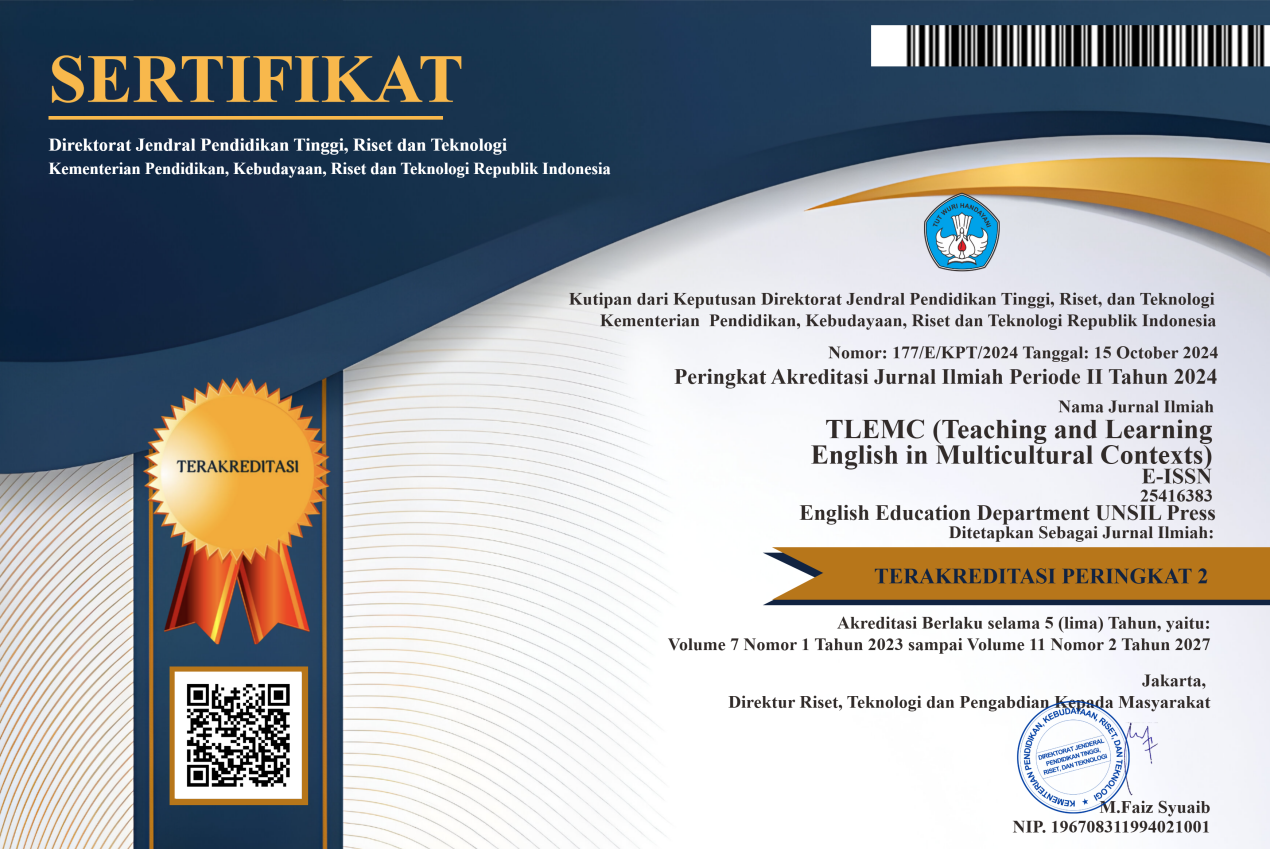Using Video Recording Task to Improve English Speaking Skills of Students at Management Program
Abstract
The main goal of this research is to develop learning method which can improve the speaking skills of students at Management Program by implementing video recording tasks.  This research is Research and Development (R&D) research employing the ADDIE (Analysis, Design, Development, Implementation, and Evaluation) Model. The respondents in this study were 30 students who took part in English I subject of Management Program. The instruments used in this study were speaking evaluation sheet, questionnaires, and semi-structured interviews. The research data was obtained from their responses to the questionnaire given related to the use of video recording tasks to improve the English-speaking skills of the students at Management study program. From the results of the study, it can be concluded that using a task-based approach to video recording can effectively help students improving their speaking skills. This can be shown that fluency, vocabulary, grammatical structure and pronunciation have P value lower than 0,05, meaning that those variables significantly support the use of video recording task to improve students speaking skills. Besides, students express their pleasure and positive perception of the method. In conclusion, the use of task-based video recording methods can effectively help students improve their oral skills, not only for exams, but also for their real life and future needs. Additionally, students express their pleasant and positive views on this method. Â
Â
Keywords: English Language, Speaking Skill, Video Recording Task
Full Text:
PDFReferences
Aldoobie, N. (2015). ADDIE Model. In American International Journal of Contemporary Research (Vol. 5, Issue 6). www.aijcrnet.com
Almelhi, A. M. (2021). Effectiveness of the ADDIE Model within an E-Learning Environment in Developing Creative Writing in EFL Students. English Language Teaching, 14(2), 20. https://doi.org/10.5539/elt.v14n2p20
Azkiyah, S. N., & Rahayu, R. (2018). EXAMINING THE ROLE OF VIDEO-RECORDED SPEAKING TASK IN ENHANCING STUDENTS’ ORAL PRODUCTIVE SKILL. IJEE (Indonesian Journal of English Education), 5(2), 204–218. https://doi.org/10.15408/ijee.v5i2
Azlina, K., Eliwarti, & Novitri. (2015). A study on the speaking ability of the second year students of SMK Telkom Pekanbaru. Jurnal Online Mahasiswa Fakultas Keguruan Dan Ilmu Pendidikan Universitas Riau (JOM FKIP UNRI), 1–13. https://media.neliti.com/media/publications/206186-none.pdf
Fahmi, R., Muslem, A., & Usman, B. (2021). The use of Problem Based Learning to improve students’ speaking ability. English Education Journal, 12(2), 260–281. https://doi.org/10.24815/eej.v12i2.17920
Gromik, N. A. (2013). Investigation of the cell phone video recording feature by Japanese undergraduate EFL learners. http://researchonline.jcu.edu.au/40269/
Happyanto, R. (2013). Pembelajaran Inovatif. Jakarta. Duplish.
Haryudin, A., & Jamilah, S. A. (2018). TEACHER’S DIFFICULTIES IN TEACHING SPEAKING USING AUDIO VISUAL AID FOR AUTISTIC STUDENTS. In ELTIN Journal (Vol. 6).
Karasic, V. M., & Vedantham, A. (2015). Video Creation Tools for Language Learning: Lessons Learned.
Marzuki, M. J., Jabu, B., & Basri, M. (2018). The use of digital Vlog Media to enhance students ’ speaking skill. Journal Pendidikan.
Moats, L. C. (2020). Speech to print language essentials for teachers. 1–11. http://slubdd.de/katalog?TN_libero_mab216782845
Nunan, D. (2003). Practical English Language Teaching (Internatio). McGraw-Hill.
Nurdin, J. (2021). Students’ Speaking Ability Awareness: A Qualitative Study at Zawiyah English Club Iain Langsa. JADEs Journal of Academia in English Education, 2(1), 44–70. https://doi.org/10.32505/jades.v2i1.3220
Oya, A., & Haryanto, L. (2022). Penerapan Video Recording Task Untuk Meningkatkan Speaking Skill Bahasa Inggris Mahasiswa Pgsd STKIP Harapan Bima. 8(4), 3094–3103. https://doi.org/10.36312/jime.v8i4.4059/http
Phi Ho, P. V., & Thanh Hong, N. T. (2019). The Effects of Peer-Video Recording on Students’ Speaking Performance. International Journal of English Linguistics, 9(4), 178. https://doi.org/10.5539/ijel.v9n4p178
Poedjiastutie, D., Amrin, Z. A., & Setiawan, Y. (2018). English Communication Competence: Expectations and Challenges (A Case in Indonesia). International Journal of Applied Linguistics and English Literature, 7(6), 184. https://doi.org/10.7575/aiac.ijalel.v.7n.6p.184
Putri, R. N., & Rahmani, B. D. (2019). Students Perception on Using Video Recording to Improve Their Speaking Accuracy and Fluency.
Rafael, A. M. D. (2019). An Analysis on Pronunciation Errors Made By First Semester Students of English Department STKIP CBN. Loquen: English Studies Journal, 12(1), 1. https://doi.org/10.32678/loquen.v12i1.1676
Rahmi, S. (2020). “Innovation in Islamic Education: Challenges and Readiness in Society 5.0†VIDEO RECORDING ASSIGNMENT ON ENGLISH FOR DAILY CONVERSATION CLASS: AN INVESTIGATION ON STUDENTS’ AFFECT.
Rumiyati, & Seftika. (2018). Anxiety of speaking English in English foreign language (EFL) class. Journal of English Education Literature and Linguistics, 1(1), 47–61.
Schutt, R. K., & Chambliss, D. F. (2013). Chapter 10: Qualitative Data Analysis. Making Sense of the Social World: Methods of Investigation, 320–357. https://doi.org/10.1136/ebnurs.2011.100352
Sunardi, A. I., & Lutfi, N. (2022). The Implementation Hybrid Learning Method for English Language Learning at AMA Yogyakarta. Acitya: Journal of Teaching and Education, 4(2), 458–474. https://doi.org/10.30650/ajte.v4i2.3288
Thien Trang, T. T., & Phuong Hong, N. T. (2021). A Mobile Video Recording Task-Based Approach to Teaching EFL Learners’ Speaking Skills. International Journal of Science and Management Studies (IJSMS), 96–116. https://doi.org/10.51386/25815946/ijsms-v4i4p111
Zuhriyah, M. (2017). Storytelling to Improve Students’ Speaking Skill (Vol. 10, Issue 1). https://ejournal.radenintan.ac.id/index.php/ENGEDU
Zulfikar, T., Dahliana, S., & Sari, R. A. (2019). An Exploration of English Students’ Attitude toward Learning English. English Language Teaching Educational Journal, 2(1), 1. https://doi.org/10.12928/eltej.v2i1.947
DOI: https://doi.org/10.37058/tlemc.v7i1.6697
Refbacks
- There are currently no refbacks.
INDEXED BY:
This work is licensed under a Creative Commons Attribution-NonCommercial-ShareAlike 4.0 International License.
![]()
TLEMC (Teaching and Learning English in Multicultural Contexts)
Program Studi Pendidikan Bahasa Inggris
Fakultas Keguruan dan Ilmu Pendidikan
Universitas Siliwangi
Jl. Siliwangi No. 24 Kota Tasikmalaya - 46115
email: tlemc@unsil.ac.id





